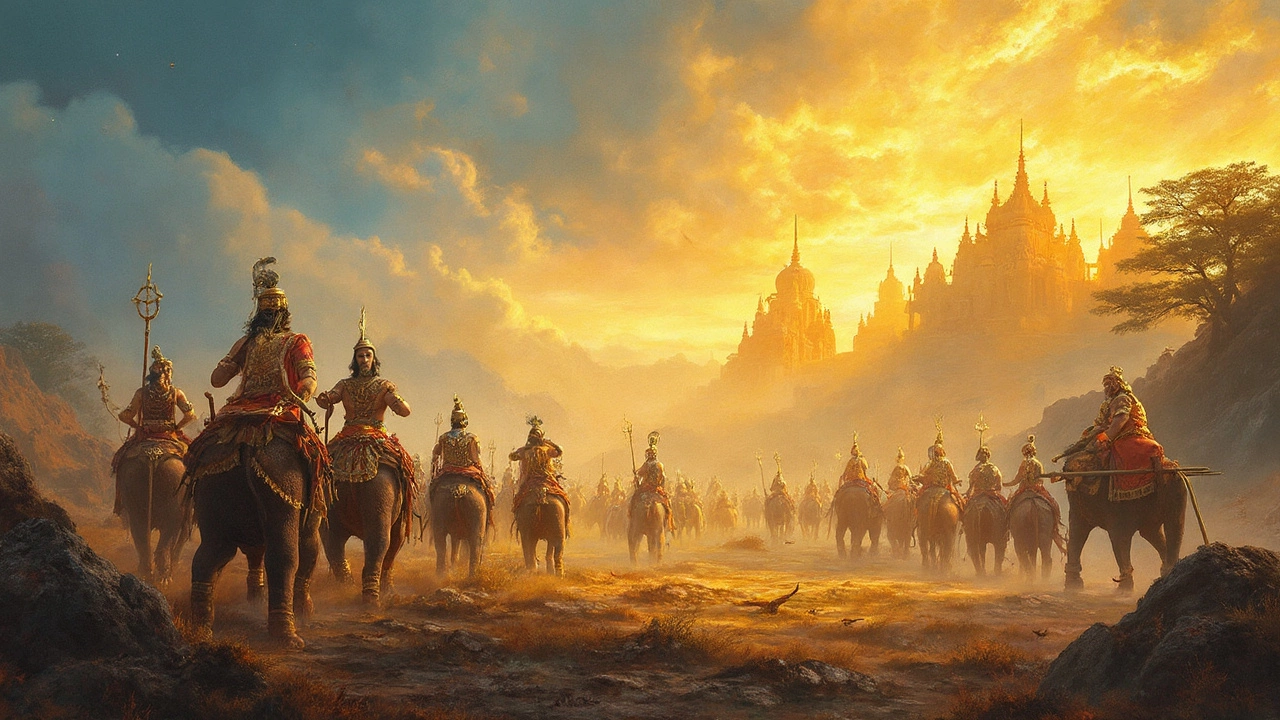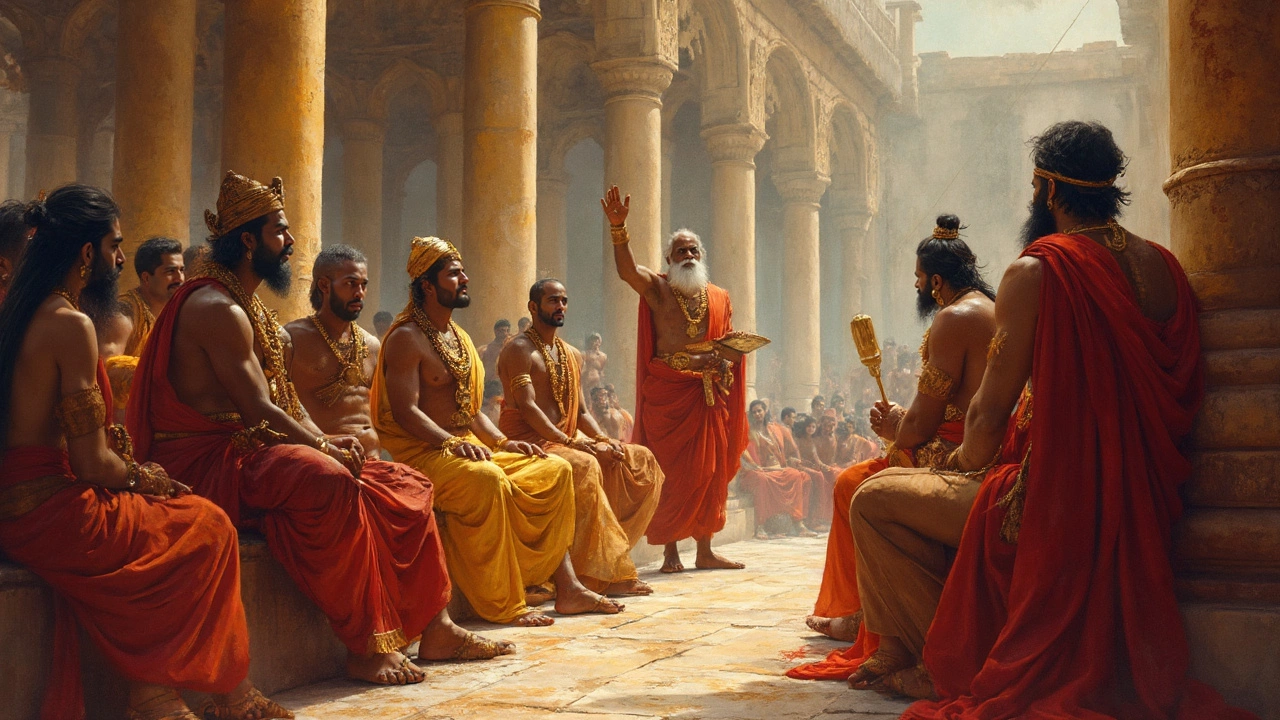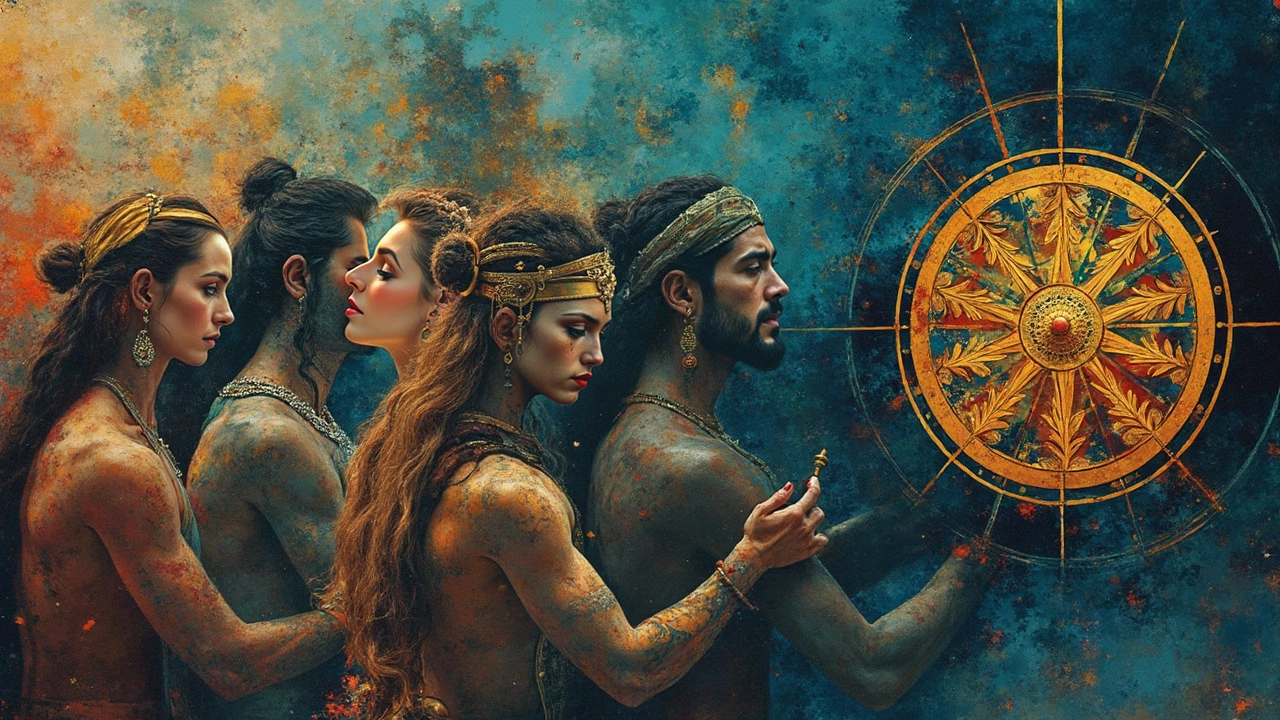Exploring the World's Longest Poem: A Tale of Sorrow
 Apr, 14 2025
Apr, 14 2025
Ever wondered what makes a poem stand out over centuries? The 'Mahabharata' isn't just about its staggering length—it's a treasure chest of emotions, stories, and wisdom. Penned thousands of years ago, this epic poem is not only the longest in the world but also a powerful narrative that draws readers into its intricate web of family ties, war, and destiny.
When you dive into the 'Mahabharata,' you're not just reading about kings and battles; you're exploring timeless themes of loyalty, betrayal, love, and sorrow. These tales are wrapped in the cultural fabric of India but hold universal truths that everyone can relate to. It's fascinating to see how these themes, despite being ancient, still resonate strongly with people today.
But why does it hold such a mighty place in the world of literature? Not just because it’s long, but because it’s profoundly moving. Every character, every event is carefully crafted to stir the deepest emotions—creating an epic that's as heart-wrenching as it is enlightening. Stick around to learn why this poem remains a cornerstone of global literature and continues to inspire poets and storytellers across the globe.
- The Astonishing Length of Mahabharata
- Themes and Messages in the Epic
- Impact on Indian and Global Literature
- Tales of Sorrow Embedded in the Poem
- Why It Continues to Resonate
The Astonishing Length of Mahabharata
When you think about epic poems, the Mahabharata takes the cake for being the longest. We’re talking about around 1.8 million words! To put that in perspective, it’s about ten times the length of the Iliad and the Odyssey combined. That's like reading the entire Harry Potter series more than twice!
The Mahabharata is composed of approximately 100,000 shlokas or verses, written in Sanskrit. These are split into 18 separate books, each packed with different stories and lessons that make it not just a poem but a complete narrative universe. Imagine having so much content that it doesn't just tell a story but creates a whole world!
Here's an interesting bit: The poem dates back to around the 3rd century BCE, but the stories likely existed orally well before. It’s like this massive collection of tales passed down through generations before someone decided to pin it all down in writing.
Given its length and depth, it’s no wonder that the Mahabharata continues to be a goldmine for those interested in epic poetry. It's packed with everything from heroic battles to deep philosophical debates.
This epic doesn't just stop at being a monumental read; it contains countless subplots and stories that make it endlessly fascinating. Dive into it, and you might just find yourself lost in its pages, still pondering over its stories long after you’ve put it down.
Themes and Messages in the Epic
When you pick up the 'Mahabharata,' be prepared to dive into a sea of emotions and life lessons. One of its enduring themes is loyalty. Characters like Karna and Bhishma showcase unwavering allegiance, whether it's through undying friendship or standing by one's vows. These stories highlight how loyalty can be both a strength and a tragic flaw, impacting everyone involved in the narrative.
Another powerful theme is betrayal, woven intricately into the storyline. Think of the infamous dice game where Yudhishthira loses everything, including his freedom. That betrayal shakes up the entire epic and sets the stage for the battle at Kurukshetra. It's a reminder of how deception can corrode trust and spark massive conflict.
And what about love? It runs as an undercurrent throughout the epic. The devotion of Draupadi towards her five husbands and the intense brotherly love between the Pandavas illustrate the different dimensions of love—sometimes tender and sometimes complex.
The epic also goes deep into moral dilemmas and the idea of dharma, or duty. Characters constantly grapple with what's right and what’s easy, portraying real struggles that resonate with readers even today. The constant push and pull between personal desire and greater good make the story all the more relatable.
Finally, there's the inevitable sorrow, deeply embedded in the 'Mahabharata'. The catastrophic war leads to essential questions about violence, revenge, and the cost of ambition. In the end, the epic is more than a story; it's a mirror of life's eternal truths, making it a compelling read for anyone looking to understand the human condition.

Impact on Indian and Global Literature
The Mahabharata isn't just a big book of tales. It's a pillar in both Indian and global literature. In India, it's like a cultural foundation stone. Generations have grown up hearing its stories, and these tales have shaped the way Indian values and ethics are understood and passed down.
Across India, you see its influence everywhere—from movies and TV shows to plays and dance dramas. It's like this ancient story has a modern twist every time it's retold. Bollywood has countless films inspired by it, and even street plays in villages echo its themes. Its characters and their moral dilemmas are deeply woven into everyday Indian life, influencing how people think about justice, duty, and loyalty.
Beyond India's borders, the Mahabharata has also made waves. It's been translated into many languages, reaching a global audience that finds its complex characters and epic scale intriguing. Authors and poets across the world, from Southeast Asia to Europe, have drawn inspiration from its vast tapestry of narratives.
In academia, the study of this epic has fueled tons of research. Scholars explore its layers for insights into ancient cultures, literature, and philosophies. It bridges gaps between the past and present, East and West—showing that the human quest for truth and meaning is universal and timeless.
But why the fascination? A lot comes down to its ability to connect with people on a personal level. It's not just about grand battles and gods but about raw human emotion—jealousy, ambition, love, and heartbreak—which everyone can relate to. So, Indian literature isn't the only one enriched by this epic; it’s global storytelling that’s been given a powerful tool to explore humanity in all its varied shades.
Tales of Sorrow Embedded in the Poem
When you think of the 'Mahabharata,' tears and heartbreak aren't far behind. The poem is filled with tales of sorrow that hit close to home. Unlike typical bestsellers which might tackle a single tragedy, this epic has multiple layers of emotional depth. Each story conveys loss in profoundly different ways, keeping readers emotionally involved with every twist and turn.
One of the most gut-wrenching tales is that of Amba, one of the princesses abducted by Bhishma. Her life story turns into a bleak tale of fate and vengeance. Rejected by her lover and humiliated, she vows to destroy Bhishma and spends lifetimes pursuing that one aim. Heartbreaking, right? Her struggle against societal norms and fate's cruelty is one that many find relatable, even now.
Then there's the tragedy of Karna. Born to a princess who abandons him, he grows up unaware of his royal roots. Despite his strength and valor, he's never fully accepted by society, due to his supposed low birth. Karna’s life is a reminder that not everyone gets to play with a winning hand, and sometimes, no matter how hard you try, the world can be unfair.
The tale of Draupadi, shared by five husbands, also echoes with sorrow. Her humiliation in the court of Hastinapur is a dark moment that reflects on the injustice and trials women faced, and unfortunately, still face today. Her strength and perseverance in adversity serve as a source of inspiration.
The epic is also rife with the grief of war. The battle of Kurukshetra itself is a culmination of sorrow, where family members fight against each other, leading to widespread loss and destruction. It's a stark reminder of the futility of war and the heavy price that comes with it.
These stories aren't just relics of the past. They’re living, breathing reminders of real-life challenges people face. The sadness in 'Mahabharata' is as timeless as the lessons it carries, resonating with anyone who's ever faced their own battles against life's unfairness.

Why It Continues to Resonate
The longest poem in the world, the 'Mahabharata', holds a special place in hearts not just because of its size, but because of how deeply it understands human nature. Even though this epic was written ages ago, its stories and lessons are still super relatable thanks to the timeless themes it explores.
At the heart of the 'Mahabharata', you've got big questions about right and wrong, love and hate, and the often blurry line separating them. It's this kind of moral complexity that makes the poem hit home for a lot of folks even today. You read it and you end up finding yourself reflecting on your own life choices and connections.
Another reason why this epic poem continues to impact Indian literature and beyond is its sheer depth and detail. It's not just the story of a war but also a deep dive into various philosophies and cultural practices. The 'Bhagavad Gita', for instance, a part of this epic, is all about life's purpose and has inspired many scholars and spiritual leaders around the globe.
Sad poetry lovers find a lot to connect with here. The sentiment of loss, the tragedy of war, and the sacrifice depicted in the Mahabharata echo the real emotions and experiences that people go through, making it remarkably easy to empathize with the characters.
It also helps that there's a ton of modern adaptations—movies, TV shows, books—that keep bringing these ancient stories back into the limelight. Each new version manages to connect with today's audience by focusing on themes that remain relevant, such as the cost of ambition or the burden of family duty.
Lastly, this epic benefits from an amazing oral tradition. For centuries, it's been told and retold in various forms, each time adding new flavors and strengthening its place in public consciousness. It's a testament to how legendary storytelling never goes out of style.